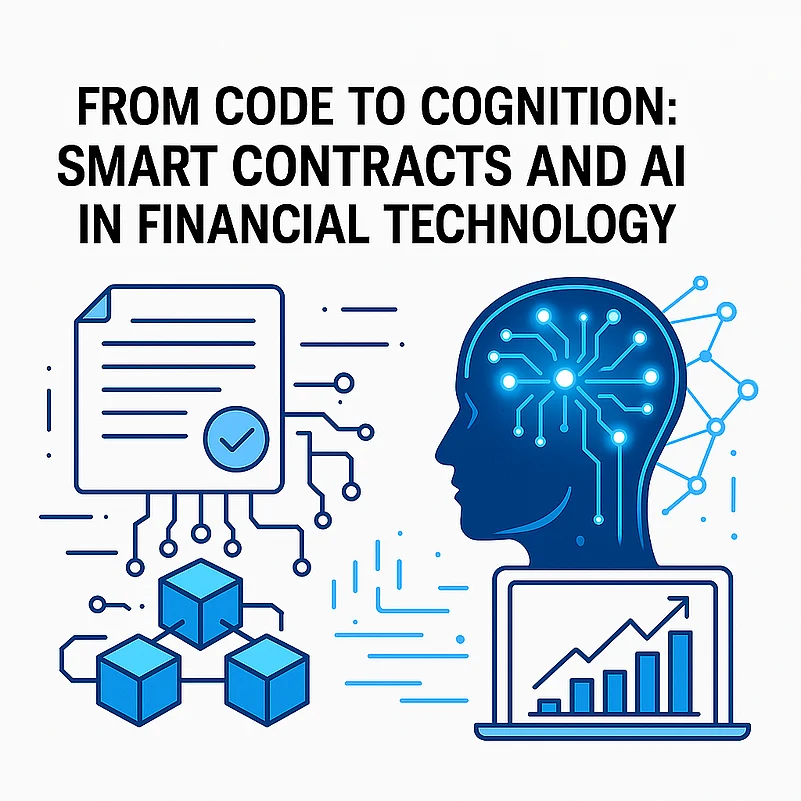The financial technology (fintech) sector is undergoing rapid transformation, driven by the dual forces of blockchain decentralization and artificial intelligence (AI)-based automation. In this evolving landscape, , a Senior Software Engineering Manager in Payments at The Huntington National Bank, is reimagining the architecture of secure, transparent, and intelligent financial systems.
Her latest research paper, "Smart Contracts and Machine Learning: Exploring Blockchain and AI in Fintech", published in the Indian Journal of Science and Technology, is earning recognition for pushing the boundaries of AI innovation in the fintech domain. The study introduces novel architectural models, data-driven insights, and applied technology frameworks to support scalable, compliant, and consumer-centric financial operations.
Research Problem and Technical Innovation
The core research problem addressed in the study is the disconnection between immutable, decentralized blockchain systems and intelligent, adaptive technologies like machine learning (ML). Traditional financial systems are highly centralized, making them prone to data breaches, fraud, and single points of failure. Moreover, they struggle with:
Inflexible transaction handling
Slow and manual compliance procedures
Limited credit access for populations without a formal credit history
Ineffective fraud detection based on static rules
While blockchain ensures data integrity and security through decentralization and immutability, it lacks intelligence for dynamic decision-making. Conversely, ML offers prediction and adaptability but requires secure and trustworthy environments to operate.
The research identifies this gap and proposes a solution: merging blockchain-based smart contracts with ML-driven automation, addressing security, regulatory, and efficiency concerns simultaneously.
This study introduces several technical breakthroughs:
1. Hybrid Infrastructure Design
A novel architecture that fuses:
Smart contracts for automating workflows (e.g., KYC/AML, payments, settlements)
Machine learning algorithms for risk prediction, fraud detection, and real-time compliance checking
2. Adaptive Credit Scoring Model
Integrates on-chain (e.g., wallet transactions, smart contract usage) and off-chain data (e.g., utility bills, social activity)
Enables decentralized credit evaluation for underbanked individuals
3. Real-time Fraud Detection Engine
ML algorithms flag abnormal patterns instantly
Reduces fraud detection latency by up to 80% compared to legacy systems
4. Smart Compliance Layer
Embeds dynamic rule engines into smart contracts
Enables real-time enforcement of global regulations
These innovations go beyond previous research that mostly viewed blockchain and ML as siloed solutions, showcasing how their synergy can transform fintech infrastructure.
Experimental Method and Conceptual Framework
The research integrates both quantitative and conceptual modeling. Chatterjee designed an evaluation framework using a combination of flowcharts, architectural diagrams, and data tables to illustrate the operational efficiency, security gains, and risk mitigation outcomes of her hybrid architecture. She includes applied use cases such as:
Automated KYC and AML workflows using smart contracts.
Predictive fraud detection based on transaction pattern analysis.
On-chain and off-chain data fusion for decentralized credit evaluation.
This approach offers a replicable blueprint that financial institutions can use to transition from monolithic systems to intelligent, modular, and decentralized platforms.
Major Contributions
Unlike earlier works that treated AI and blockchain as parallel innovations, Chatterjee라이브 바카라 research reveals the synergistic potential of integrating them. Her major contributions—and their direct industry benefits—include:
Pioneering Adaptive Credit Scoring Models
Introduces an innovative framework that leverages real-time machine learning on decentralized finance (DeFi) platforms. By synthesizing on-chain and off-chain behavioral data, this model enables highly accurate, inclusive, and dynamic credit evaluations, especially for underbanked populations.
Business Impact: Expands the addressable market by enabling lending to underserved segments, increases revenue from new customer groups, and reduces default rates through dynamic risk assessment.
Regulator-Ready Compliance Architecture
Proposes a next-generation compliance model where smart contracts are seamlessly linked to dynamic rule engines. This allows financial institutions to automatically align with evolving global regulations, including AML, KYC, and GDPR.
Business Impact: Saves up to 50% in compliance management costs, reduces the risk of regulatory penalties, and accelerates international market expansion by ensuring regulatory agility.
Intelligent Fraud Prevention Blueprint
Designs a machine learning-powered fraud detection system that reduces detection latency by up to 80%, shifting from reactive, batch-based processing to real-time anomaly detection—a critical upgrade for modern digital finance.
Business Impact: Prevents significant financial losses, strengthens consumer trust, enhances brand reputation, and lowers insurance premiums related to fraud risk.
Smart Contract Automation for Operational Workflows
Embeds automation into payment settlements, customer onboarding, and real-time audits via smart contracts.
Business Impact: Cuts operational costs by up to 60%, shortens processing times from days to minutes, and improves customer satisfaction and conversion rates.
Replicable Framework for Scalable Fintech Systems
Backed by real-world simulations and architectural diagrams, the study offers a blueprint that financial institutions can directly adopt to transition from legacy systems to intelligent, modular infrastructures.
Business Impact: Reduces system development time and cost, lowers vendor lock-in risks, and enables faster go-to-market for innovative financial products.
Collectively, these contributions not only redefine the technological landscape of fintech but also offer measurable business value—fueling growth, enhancing efficiency, and driving cost-effective innovation across global financial systems.
Recognition as an Industry Expert in AI and Fintech
Pushpalika Chatterjee라이브 바카라 work represents a breakthrough in AI-integrated fintech architecture. It pushes the boundaries of what라이브 바카라 possible in secure digital finance by offering a flexible, intelligent, and compliant model that institutions can adopt today. Her ability to navigate complex trade-offs between automation, privacy, and regulation places her among the most influential AI innovators in the fintech sector.
She has contributed original knowledge that is referenced in technology leadership discussions on decentralized identity, algorithmic risk management, and AI compliance governance, further underscoring her stature as an industry-leading researcher and practitioner.
In conclusion, Pushpalika Chatterjee has established a new paradigm in fintech evolution. Her work lays the foundation for intelligent, inclusive, and secure digital financial systems, marking a significant leap forward in the field.














